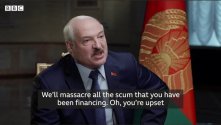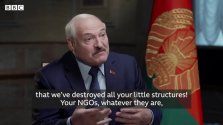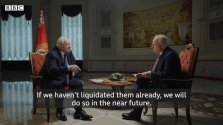Myanmar the new front as U.S.-China tensions simmer on land
As tensions between China and the United States keep rising, 2022 could see a new front open along China's 2,000-kilometer border with Myanmar.
Unlike the risky but manageable naval maneuvering in the contested South China Sea, the sparring on land is likely to assume the form of difficult to rein in proxy conflicts with consequences for the wider region.
After progressively extending its influence into mainland Southeast Asia over the past two decades mainly via infrastructure investment, Beijing has more recently intervened in Myanmar's complex array of ethnic conflicts, conducted joint patrols along the Mekong River and, most controversially, is now said to be
in Cambodia.
In response, the U.S. has aggressively retooled the pivot to Asia initiated during the Obama administration, with Congress recently approving $7 billion in defense spending for the region, mostly focused on the U.S. Navy.
But over the past year, Washington has been working feverishly to establish closer ties with mainland states, particularly Thailand, a treaty ally, with no fewer than six senior officials visiting Bangkok since July.
Containing China on land, however, is proving a lot harder than moving naval assets around the South China Sea, with the U.S. forced to draw from its Cold War playbook by blending humanitarian aid with strategic military assistance.
When senior U.S. State Department official Derek Chollet went to Bangkok in October, his request to open a humanitarian corridor across the Thai border into Myanmar seemed like a useful way to address the humanitarian needs generated by the increased fighting there. But the proposal included a significant rider that the corridor be serviced by U.S. aid agencies.
To veterans of the last Cold War, this was reminiscent of U.S. operations along the Thai-Cambodian border in the 1980s, when nonlethal assistance was allegedly provided to non-Communist elements fighting the Khmer Rouge.
After Thai Foreign Minister Don Pramudwinai hurriedly agreed to the U.S. request, other Thai officials were less certain, suggesting that it was only a "concept for further discussion." Thailand, ever wary of upsetting China, may prefer that humanitarian assistance into Myanmar be handled by a broad range of countries and agencies.
China, for its part, has not stood idly by. Fighting in northern Shan State over who controls lucrative narcotics trade routes close to the Chinese border has intensified with the Shan State Progress Party and Ta'ang National Liberation Army, which are intent on pushing the Restoration Council for Shan State (RCSS), back toward its traditional domain near the Thai border, receiving assistance in the form of Chinese weaponry and soldiers from the China-backed United Wa State Army.
As to why China has lent indirect support to their enemies, RCSS sources worry that they are seen as a potential proxy for U.S. efforts to counter China's influence in Myanmar.
Historically, the RCSS was close to the remnants of the Kuomintang Nationalist Chinese army that fled into Thailand and Burma, as Myanmar was then known, in 1949 -- remnants that Beijing doubtless recalls the U.S. supporting through the 1960s under the guise of development aid to Burma. More recently, China has protested to Myanmar authorities whenever U.S. officials traveled north of Shan State, suggesting a notional boundary between U.S. and Chinese zones of influence.
History has not repeated itself yet, but ethnic armed group leaders based in Thailand are worried that China and the U.S. may be tempted to use the escalating conflict in Myanmar as a convenient proving ground for power and influence over the rest of Southeast Asia.
They point to a diplomatic tussle between China and Thailand over the construction of the new $300 million U.S. consulate in Chiang Mai, which Beijing sees as an attempt to reinforce existing U.S. intelligence gathering capacity in northern Thailand, less than 500 km from the Chinese border.
Meanwhile, trading carrots for sticks, the U.S. has
for allegedly allowing China to build a naval base at Ream. The evidence for this is based on reports of land clearance and renovation of a facility previously built by the U.S. Cambodia denies that China is building a base, though a much larger deep-water port and 1500-meter runways are currently being built by a Chinese contractor further west at Butom Sakor, allegedly for Chinese tourists.
Without a doubt, China is extending its hard-power capacity and influence across the Mekong subregion. Reports from diplomatic sources in Thailand indicate that China initiated more than 100 joint patrols with law enforcement from Laos, Cambodia and Thailand along the Mekong in the past year. And both China and the U.S. are competing to provide COVID-19 vaccinations and other humanitarian needs in the region.
These developments at the sharp end of a new Cold War on mainland Southeast Asia are a worry because they could complicate and prolong the already complex array of conflicts in Myanmar that is already long suspicious of both China and the U.S. for precisely this reason.
as the human cost of the Feb. 1 military takeover in Myanmar continues to mount, regional states may be tempted to welcome Chinese or U.S. intervention, as was the case in Cambodia almost half a century ago.
To prevent an escalating confrontation between the U.S. and China, it is more important than ever for Southeast Asian nations to step up efforts to address the conflict in Myanmar. The apparent failure of ASEAN's diplomatic engagement with the Myanmar military after the takeover presents opportunities for bigger powers such as India to step in.
Ultimately, the viability of a mainland front in the contest for geopolitical primacy comes down to economics. In the last Cold War, Washington was preeminent in a region that depended on U.S. aid and investment. Today the shoe is on the other foot: China has a commanding lead when it comes to trade and investment over any other power, with the added advantage of contiguous geography.
Non paywall



